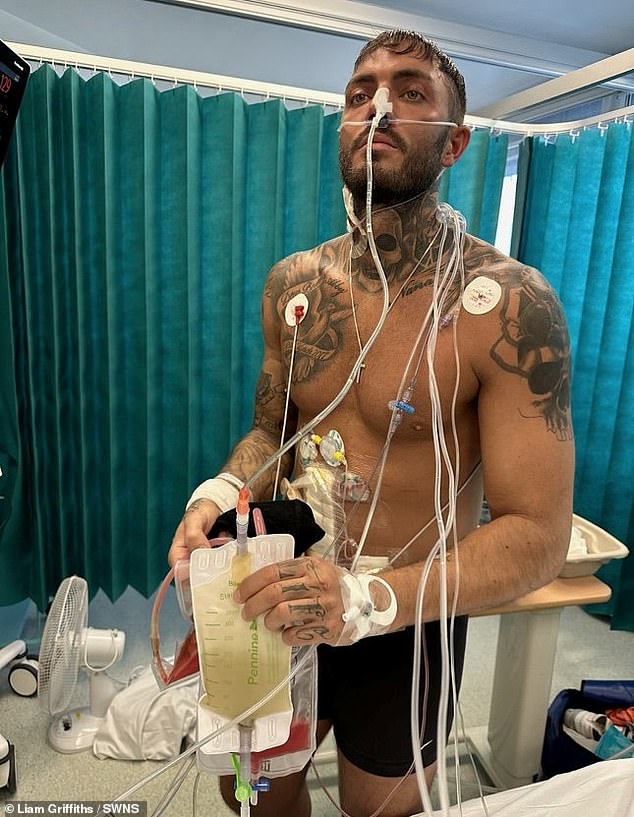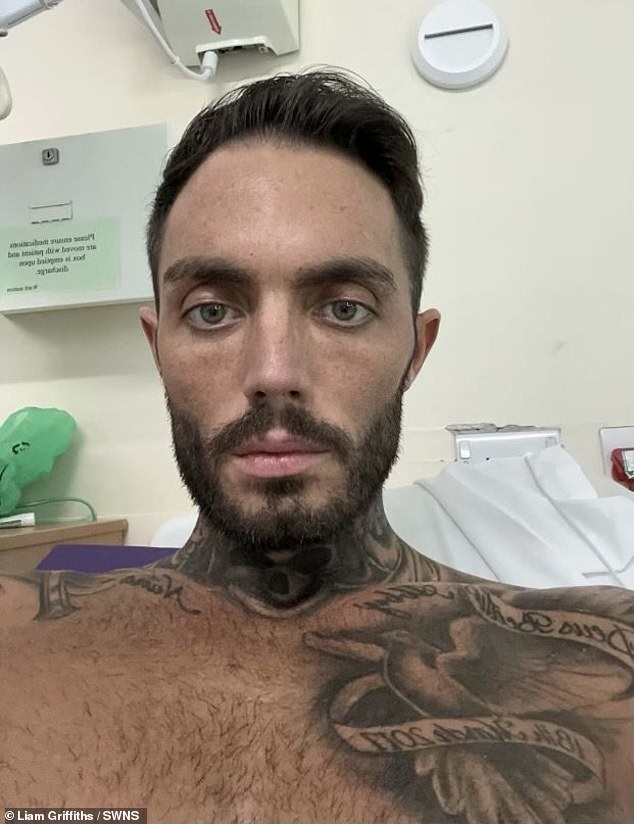Cancer-stricken man, 31, says he could have avoided terminal diagnosis – if he hadn’t tried to ‘man up’ and ignore tell-tale symptom
A 31-year-old man diagnosed with terminal cancer says he could have been saved – if he hadn't tried to ignore the symptoms.
Liam Griffiths, from Middlesbrough, suffered stomach swelling, chronic constipation, cramps and vomiting in March.
But the ex-oil rig worker, who described himself as the 'healthiest man in the world' and trained every day, decided not to make a fuss and take over as he was self-employed and needed the money.
Mr Griffiths' symptoms eventually became unmanageable and he went to hospital, where he was diagnosed with Crohn's and later peritoneal cancer.
He went under the knife, but was told by doctors that his operation was unsuccessful and that his cancer was terminal.
Liam Griffiths, 31, (pictured) ignored his stomach swelling, chronic constipation, cramps and vomiting, but now he regrets not going to the doctor sooner
Now he is coming to terms with his stage four peritoneal cancer, a rare form that affects the thin layer of tissue lining the abdomen.
There are no exact figures on how many people get it in Britain.
But Cancer Research UK says it mainly affects women and people over the age of 60.
The first symptoms include a swollen abdomen, abdominal pain, constipation, diarrhea, being sick, bloating and loss of appetite.
Discussing his battle with the disease, Mr Griffiths said: 'Not getting checked sooner is the biggest mistake I have ever made.
'They discovered my cancer was advanced at stage three, but if I had gone to the doctor sooner they might have caught the disease.
'I was self-employed and I needed the money, so I kept working.
'I did what I thought a man should do. I was manning.”

He was diagnosed with stage four peritoneal cancer, which affects the thin layer of tissue lining the abdomen

Mr Griffiths said that after training every day he was no longer able to walk up stairs without getting tired
When he finally went to the hospital with his symptoms, he was told he probably had Crohn's disease, an inflammatory bowel disease.
But the following month he received a call from the doctors asking him to come to the hospital immediately.
Then the doctors told him he had peritoneal cancer and needed chemotherapy.
“As soon as they told me to bring my mother, Susan, I knew,” Mr Griffiths said.
“I don't even remember the hospital trip; I just shut out the trauma.
“I remember asking what my life would be like and my doctor saying he doesn't want to give me a time frame for when my life might end because he doesn't want me to focus my whole life on that.”
But Mr Griffiths admits he felt 'vulnerable' and was a 'shadow' of who he once was.
'I was the healthiest man in the world. “I have been training every day, but now I can't even walk up the stairs without sweating,” he said.
“I'm literally living the worst kind of life I could have ever imagined. It's terrible.
'Mentally it has been taken out of me. Physically it took it out of me.”
Although he had many adventures on his bucket list, including swimming with sharks, skiing and Tough Mudder, his rapidly declining health has forced him to change his plans.
“I have to choose things where I can sit down because I won't be physically able to do things I originally wanted to do. I think my mother wants to plan a train trip,” he said.
“I just want to make sure we have those important memories together before I might have to go.”
The chemotherapy treatment available on the NHS is no longer working for Mr Griffiths and he is now paying for private treatments, scans and medicines in a bid to extend his life.
His girlfriend Eve Bannatyne, daughter of Dragon's Den star Duncan Bannatyne, has helped raise more than £18,000 for Mr Griffiths on JustGiving which was founded two months ago.
Writing on his JustGiving page, she said: 'He is bravely battling terminal cancer at the age of 31 and we urgently need support to access medicines to ease his pain and hopefully extend his life.
“Liam has shown incredible strength and resilience throughout this challenging journey and has the biggest heart. He doesn't deserve to go through all this.
'Every donation, no matter how small, can make a world of difference.'
Mr Griffiths wants his terminal cancer diagnosis to be used as a lesson for other men to stop ignoring their symptoms and get checked out.
